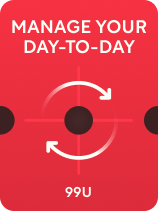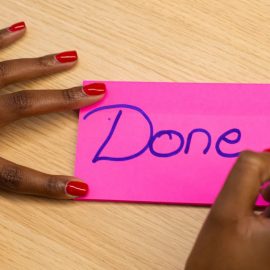

This article is an excerpt from the Shortform book guide to "Manage Your Day-to-Day" by 99U and Jocelyn K. Glei. Shortform has the world's best summaries and analyses of books you should be reading.
Like this article? Sign up for a free trial here.
Do you struggle to stay on task? How much more could you get done if you stayed focused?
Focus doesn’t just happen; it’s a result of a decision you make. Manage Your Day-to-Day provides advice on practicing intentional focus, including setting up the right environment, handling internal discomforts to minimize distractions, focusing for longer periods of time, and embracing boredom.
Read more to learn about these practical tips from Dan Ariely, Chris Bailey, Nir Eyal, Cal Newport, and Leo Babauta.
Intentional Focus
Often the decisions you make that cause you to lose focus—to check email, answer a text message, or grab yet another cup of coffee—are unconscious choices. According to behavioral economist Dan Ariely (Predictably Irrational), most of the choices we make are unconsciously determined by what he refers to as choice architecture, the arrangement of options that influence our decision-making. He shares ways that we can practice intentional focus; in other words, we can decide to focus by taking deliberate actions.
(Shortform note: According to Chris Bailey, the author of Hyperfocus, before you change any behavior, you must first become more aware of these unconscious choices. To increase your self-awareness, he suggests setting an attention alarm, or “hourly awareness chime,” to go off every hour. When it rings, note where your attention is at that moment. Specifically, Bailey recommends asking yourself questions like: What am I doing right now? Is this what I want to be working on? If you find that your focus isn’t on your priority task, refocus your attention on what matters most to you. If you notice things about your environment that are consistent sources of distraction, change them.)
Ariely explains that, by organizing your environment to minimize distractions and setting defaults that encourage focus, you can create environments that help you concentrate better and avoid choices that hinder your ability to pay attention. For example, if you often find yourself getting distracted by social media, you can change the choices available by turning off your phone. This change in the choice architecture will reduce the temptation to check your phone and keep your attention focused on your creative work.
| Other Sources of Distraction While Ariely explains how minimizing environmental distractions will improve your focus, Nir Eyal, the author of lndistractable, points out that up to 90% of our distracted behaviors are due to an internal trigger or discomfort, such as anxiety, stress, or boredom. He suggests several steps to help develop your ability to deal with internal discomforts before they become distracted behaviors. First, take time to meaningfully reflect on your triggers and make more deliberate choices about your response to them. For example, if you notice you reach for your phone to distract yourself when you feel overwhelmed, try taking a few deep breaths instead, or engaging in a short mindfulness exercise or another activity that helps you address the underlying anxiety in a healthier way. Second, rethink how you label yourself. You naturally align your behavior to fit the way you see yourself, so refrain from labeling yourself in a self-defeating way—for example, “easily distracted” or “incapable of deep focus.” Finally, relabel yourself as “focused” or “able to sustain deep work” in order to prompt more focused behaviors. |
In addition to setting up your environment to encourage focus, practice focusing for longer periods of time. Cal Newport suggests identifying a concrete task and then focusing on that task for one hour. If you’re able to sustain focus that whole time, without succumbing to any distractions, then add 15 minutes to your focus time every two weeks. If you get distracted, he suggests stopping and trying again later. This will train your mind that distractions are unacceptable.
(Shortform note: According to Newport, another way to improve your focus is to embrace boredom. In idle moments, like waiting for the bus or standing in line, most people reflexively pull out their phones to scroll through social media or check their texts. Newport says when you always fill these low-stimuli moments with high-stimuli activities, you deplete your brain’s ability to tolerate boredom. He suggests building your brain’s “focus muscles” by consciously letting yourself be bored in low-stimuli moments. For example, if you’re waiting outside of a bar for your friend, consciously resist taking your phone out. Instead, just sit still and take in whatever’s going on around you.)
Another way to practice focus is through meditation. According to Leo Babauta, the author of The Power of Less, being still and focusing on your breath will improve your ability to sustain attention. This practice also cultivates heightened self-awareness, allowing you to recognize distracting thoughts and resist the pull of distractions, enabling you to stay present in the moment.
(Shortform note: Meditation can be intimidating for people who have never tried it before. In Mindfulness in Plain English, Bhante Gunaratana offers a beginner’s guide to starting a meditation practice. He says the goal of meditation is to cultivate awareness, the ability to listen to our own thoughts without getting caught up in them. He explains that the first step in a meditation practice is to find a comfortable seated position. Then sit motionless, close your eyes, and focus on your breath. If your mind wanders, just gently bring it back to your breath. He recommends starting for a short period of time, but he assures that your stamina will increase over time.)

———End of Preview———
Like what you just read? Read the rest of the world's best book summary and analysis of 99U and Jocelyn K. Glei's "Manage Your Day-to-Day" at Shortform.
Here's what you'll find in our full Manage Your Day-to-Day summary:
- That creativity is the result of disciplined work habits, not innate genius
- Tips from experts on how to boost your creativity, focus, and productivity
- Why you should never strive for creative perfection






